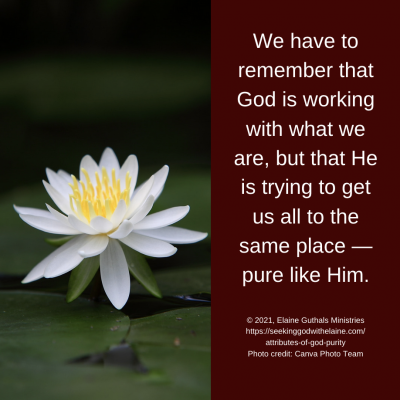We get that God is holy. That means He is pure. This daily devotional looks at how God is pure and what that means for us.
Nuggets
- He is pure, faithful, and blameless in what He does because He is pure, faithful, and blameless.
- God is pure and can’t tolerate sin, but He loves us and calls us to salvation.
- Because God is pure, His laws and commandments are, too.
- If God is pure, and His laws and commandments are pure, that means His Word is pure, too.
To read devotions in the Redo for Godliness series, click the appropriate button below.
Devotions in the Finding Our Center series

Okay, let’s start this out by going Dictionary Chick. We’ve got to connect the dots and establish some what we mean before we get to the evidence.
God is holy. Holy means to be set apart, perfect, and pure.
God’s holiness is a result of His purity. Holiness is more than a character trait; it is purity, dedication, and commitment that lead to being set apart. Purity means without the stain of sin.
Sins are actions by humans that disobey God and break one of His reasonable, holy, and righteous laws and commandments, goes against a purpose He has for us, or follows Satan’s promptings.
So, what does it mean that God is pure?
Let's Put It into Context
Here is a running list of what we’ve discussed previously.
God Is Pure
“With the faithful you prove yourself faithful, with the blameless you prove yourself blameless, with the pure you prove yourself pure, but with the crooked you prove yourself shrewd” (II Sam. 22: 26-27 CSB)
He is pure, faithful, and blameless in what He does because He is pure, faithful, and blameless.
Second Samuel 22: 26-27 are great verses. These words are told in two places in Scriptures. The first is here in Samuel; the second place is Psalms 18: 26.
I think we can take these words two ways. The first way is like the Biblical Illustrator wrote: “You say that the desert is a desert, because no rain falls upon it; but this is only half the truth. No rain falls upon it because it is a desert.”
Resource
Who and what we are greatly influences what happens to us. It is the same with God. He can show those who are like Him exactly Who He is.
The second way to take these words is God reveals Himself to us beyond what is written in Scriptures. That can be in different ways, though, because we are different.
Service told us that “… God shows Himself to every man according to what every man is.” God is only going to totally reveal Himself to His children.
Resource
Glossary
This is logical because we all have different experiences. We are all at different places on the Sanctification Road. It does depend on what our characters are.
Glossary
We learned, like the prodigal son’s older brother, that we shouldn’t be jealous of God how God interacts with another. We have to remember that God is working with what we are, but that He is trying to get us all to the same place — pure like Him.
To read a related devotion, click the button below.
God has to start with what each of us are and where we are. Someone who has lived in Los Angeles all their life is going to look at things differently than I do with my rural background.
But that isn’t the focus. The focus is our redo for godliness. We want to be like Him — pure.

If God Is Pure, Can He Look on Sinners?
“Your eyes are too pure to look on evil, and you cannot tolerate wrongdoing. So why do you tolerate those who are treacherous? Why are you silent while one who is wicked swallows up one who is more righteous than himself?” (Hab. 1: 13 CSB)
God is pure and can’t tolerate sin, but He loves us and calls us to salvation.
Habakkuk 1: 13 is a confusing verse. We’ve looked at it a couple of times because it begs the question as to how God can see us when we are sinners.
- We think God cannot look on sin (Still More of God’s Blessings for Merciful Disciples of Christ).
- God has a low tolerance for sin (Comprehending Christ’s Love).
- Sin created a separation from God. God, however, is right on the other side of the divide (Can God See Us If We Are Sinners?).
- When we sin, God cannot interact with us the way He wants (Morality to Honor God).
Verse Commentary
Yes, God is pure. Yes, He cannot tolerate our sin.
But He loves us. He can still call to us when we are sinners. He can still bring us salvation.
- Salvation is deliverance from evil and the consequences of sins to replace them with good and eternal life.
- The consequences of sin are spiritual death and separation from God.
- Spiritual death is the separation from God that occurred as a consequence of Adam and Eve’s original sin. The spiritually alive are those who have ABCDed, so they are no longer separated from God.
- Eternal life is the promise of living eternally – even if we have died in this life – because we have admitted our sins, believed Jesus as Savior and Redeemer, and confessed God as Sovereign Lord.
Raikes reminded us that we can’t think that love is going to win out over the intolerance of sin. He wrote, “This is no contradiction to the character in which God is exhibited to us in the Gospel, as a God of love. But we must notice the limits under which the love of God must be taken in application to ourselves. Only in the Gospel is it revealed.”
Resource
God is holy and pure, so He cannot tolerate anything less — sin. He loves us, so He can offer us salvation.
But there is one unpardonable sin, which I think is unbelief. If we can’t give up our sin and won’t submit our lives to Him, God can’t forgive that.
God can’t alter His purity to accept our impurities. He can’t reconcile Himself to sin.
The reason God sent Jesus to earth to be the Sacrifice that could Jesus’ blood could pay the penalty for our sins. That is the only way He is going to reconcile Himself to sin — do away with its hold on us.
But that is dependent on us saying we want to pure like God is. We have to ABCD.
The ABCDs of Salvation
If you have not become a believer in Christ, please read through the
Plan of Salvation and prayerfully consider what God is asking you to do.
A – admit our sins
B – believe His Son Jesus is our Redeemer
C – confess God as Sovereign Lord
D – demonstrate that commitment by making any changes needed in our lives to
live the way in which God has called us
The Disciple’s Job Description
God’s Laws and Commandments Are Pure
“The law of the Lord is perfect, reviving the soul; the testimony of the Lord is sure, making wise the simple; 8 the precepts of the Lord are right, rejoicing the heart; the commandment of the Lord is pure, enlightening the eyes; 9 the fear of the Lord is clean, enduring forever; the rules of the Lord are true, and righteous altogether” (Ps. 19: 7-9 ESV)
Because God is pure, His laws and commandments are, too.
I am not sure I have ever considered the laws and commandments being pure. I know I have felt that they were just.
I know I have considered them moral laws. But are they pure moral laws?
Well, duh! The laws show us God’s character. If God’s character is pure, the laws have to be, too.
Hankinson put it this way. He wrote, “The law was ordained for something beyond the mere curbing of transgressions; its further object was to detect, expose, and condemn the transgressing principle; in other words, by the purity which it developed and enforced to enlighten man’s eyes upon the character of God, the extent of his own moral ruin, and the absolute necessity of the restoration of the moral principle.”
Resource
Elaine-speak. The law shows us what is a sin and what isn’t. But that is not it’s only purpose.
It goes deeper into showing the principles behind the law. Why is a sin a sin — and why isn’t something a sin?
It is or isn’t because the law is consistent with God’s character. So, the laws and commandments show us Who God is.
Great! We want to know God beyond a shadow of a doubt, right? That leads to a profound love of the law on our parts, right?
Hmmmm. Probably not. We tend to see the fact that we can’t keep the laws and commandments 24/7/365. They just show us how pure we aren’t!
I think sometimes we don’t get to the part that shows us, as Hankinson said, “… the mighty moral difference between the mind that originated and the minds that received the law.”
We think more in the actions of breaking the laws and commandments instead of the differences of our characters. We’re talking morals again, which we have said needs to be kicked up to spiritual graces. The moral things we do need to be done for God’s glory and honor, not to make this place a better word — not even just to help our fellow humans.

God’s Word Is Pure
“Your word is completely pure, and your servant loves it” (Ps. 119: 140 CSB)
If God is pure, and His laws and commandments are pure, that means His Word is pure, too.
Oh, listen to this. In the Homiletic Review, it said, “A love to Divine things for the beauty of their moral excellency is the spring of all holy affections.”
We should love things about God for their purity. God gives us the ability to be aware of things holy. That is just one way in which we grow closer to Him.

Making the Connections
I really like what the Homilist had to say: “The moral constitution of man, which recoils from the wrong and sympathises (sic) with the right, manifests God’s holiness. There is no room for man, then, to doubt God’s holiness.” That says a couple of things to me.
- We want our moral constitution to be like Him. We have been saying it as we want His character to be ours.
- When we have God’s character — and recoil from wrong and do what is right — we can’t and won’t doubt God’s holiness. We will see Him as He is.
Resource
How Do We Apply This?
- We need to look for the beauty and purity in things.
- We need to strive for God’s character.
No, we won’t be pure like God until we get our new bodies. That, however, is what we are shooting for.
Father God. You are pure. Because of that, You can’t tolerate sin. Help us have Your intolerance of sin so that we may remain faithful to You. Lord, we wait for the day when we receive our new bodies that cannot sin. Amen.
What do you think?
Leave me a comment below (about this or anything else) or head over to my Facebook group for some interactive discussion.
If you don’t understand something and would like further clarification, please contact me.
If you have not signed up for the email daily or weekly providing the link to the devotions and the newsletter, do so below.
If God has used this devotion to speak with you, consider sharing it on social media.